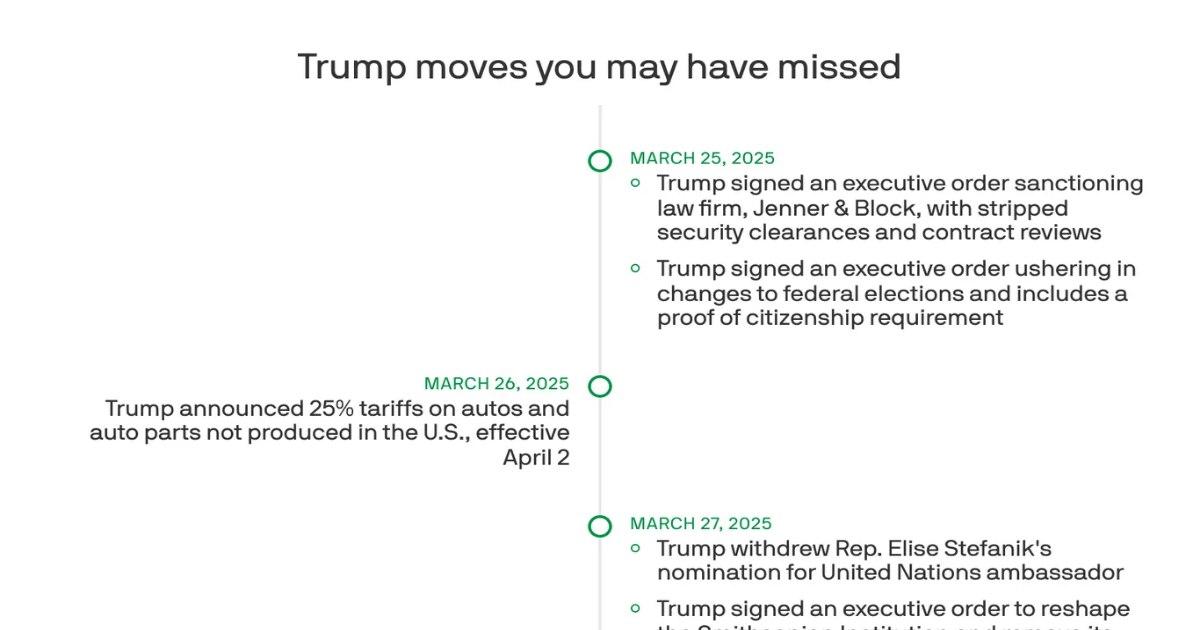

Chart: Axios Visuals
President Trump is under fire for his response to a Signal group chat that inadvertently looped in a journalist while revealing sensitive military details. In the same week, he launched plans for auto tariffs and voting restrictions.
Here’s our recap of major developments:
The White House has stacked claim atop claim this week to explain how Jeffrey Goldberg, editor-in-chief of The Atlantic, ended up in a Signal chat with Trump officials who discussed in granular detail attack plans on Houthi targets in Yemen.
- The administration ultimately carried out the airstrikes in Yemen on March 15, the same day the Signal discussion concluded, Goldberg revealed in an explosive article on Monday.
- “1415: Strike Drones on Target (THIS IS WHEN THE FIRST BOMBS WILL DEFINITELY DROP, pending earlier ‘Trigger Based’ targets),” Defense Secretary Pete Hegseth said in one message Goldberg revealed.
- The journalist initially hesitated to reveal some details in the interest of national security. That is until the White House’s narrative began to take shape.
Full Signal thread revealed
The Trump administration attacked Goldberg’s credibility, with Hegseth saying Monday that “Nobody was texting war plans” and calling the journalist “deceitful and highly discredited” in a press briefing.
- Trump claimed on Tuesday there was “no classified information as I understand it” in the chat.
So Goldberg released the full Signal chat thread between 18 senior Trump officials on Wednesday, writing in The Atlantic:
“If this text had been received by someone hostile to American interests—or someone merely indiscreet, and with access to social media—the Houthis would have had time to prepare for what was meant to be a surprise attack on their strongholds. The consequences for American pilots could have been catastrophic.”
Poll: Even Republicans say Trump’s Signalgate scandal is serious
The Signal fallout
National security adviser Mike Waltz told Fox News on Tuesday he takes “full responsibility” for mistakenly adding Goldberg to the chat. However, Trump said the mistake wouldn’t end in Waltz’s termination, that he “has learned a lesson, and he’s a good man.”
Zoom out: The government watchdog group American Oversight sued Trump administration officials on Tuesday. On Thursday, U.S. District Judge James Boasberg ordered the government to preserve the chat messages from March 11-15.
Trump pulls UN nominee
President Trump withdrew Rep. Elise Stefanik’s nomination for United Nations ambassador on Thursday, opting to keep her in the House of Representatives, with only a 218-213 seat advantage in the House.
- Trump cited the need to maintain every Republican seat in Congress to advance his “America First Agenda.”
- The move reflects growing concerns within the GOP about their slim majority and the potential impact on upcoming legislative initiatives, Axios Hans Nichols, Alex Isenstadt and Justin Green write.
The president appointed Republican Georgia state Sen. Brandon Beach as U.S. Treasurer on Thursday.
Auto tariffs coming next week
The auto industry, already struggling to compete with China, was thrown its latest curve ball on Wednesday when Trump announced 25% tariffs on cars and car parts produced outside the U.S.
- The tariffs are set to start on April 2 and cast further uncertainty on an industry already impacted by Trump’s “will-he-or-won’t-he trade saga,” Axios’ Courtenay Brown writes.
Trump pushes agenda through order
The president signed an executive order Tuesday ushering in dramatic changes to federal elections while lauding the order as “the farthest-reaching executive action taken in the history” of the U.S. to “Secure our Elections.”
- It includes a proof of citizenship requirement and aims to prevent states from counting mail-in ballots that arrive after Election Day, Axios’ Rebecca Falconer and Jeremy Duda write.
- It was one of several orders the president signed.
Trump penned orders Tuesday to:
- Pardon Devon Archer, the ex-Hunter Biden associate convicted of fraud, who testified before Congress about Biden family business dealings. Go deeper.
- Consolidate financial systems, decrease offices on non-Treasury payments, and to stop issuing paper checks — Social Security included — by Sept. 30. Go deeper.
- Strip law firm Jenner & Block’s security clearances and target a lawyer in ex-special counsel Robert Mueller’s probe into Trump’s first election. He signed a similar order targeting WilmerHale law firm on Thursday. Both firms sued the Trump administration on Friday. Go deeper.
Zoom in: The president also signed an executive order Thursday to reshape the Smithsonian Institution and remove its “improper ideology” on topics of race and gender.
More from Axios:
